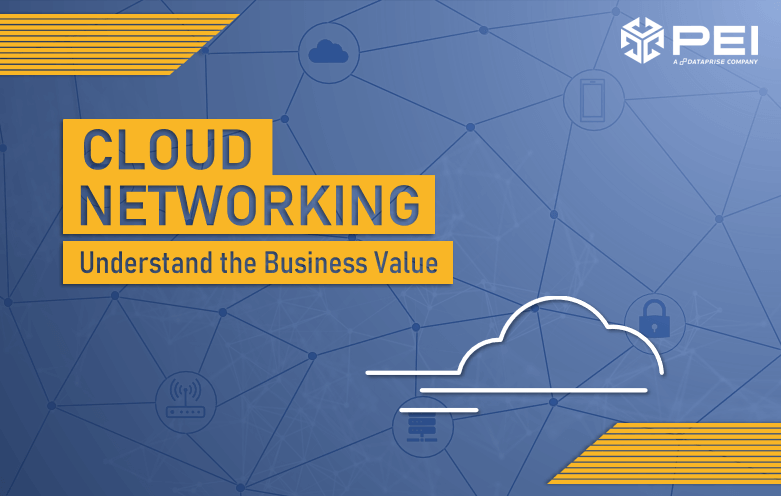
Cloud networking services enable businesses to leverage remote servers and resources via the internet so they can store, manage, and process data and applications. Instead of relying on physical infrastructure, companies that deploy cloud networking solutions like Microsoft® Azure can access everything virtually, making the entire system inherently more flexible.
Of course, as with adapting any new technology, transferring operations to the cloud can pose a few initial challenges. Access needs to be granted, employees need to be trained, and processes need to be modified. Once everything is up and running, though, businesses never look back. Read on to learn why.
What Is Cloud Networking?
Cloud networking relies on a distributed network of servers and data centers. These servers are geographically dispersed and interconnected, ensuring redundancy and minimizing the risk of data loss. Companies can access these resources through the internet, eliminating the need for on-premises infrastructure.
How Do Businesses Benefit from Cloud Networking?
Cloud networking plays a critical role in the modern world. The system is especially advantageous for small and mid-sized businesses. Here are some of the biggest reasons why:
1. Enhanced Efficiency: Streamlining Operations
Cloud networking services streamline IT infrastructure management. Once the centralized platform has been set up, it allows for data storage, application deployment, and network management. With all of this accessible from one platform, it reduces complexity and improves efficiency.
2. Ease of Scalability: Meeting Growing Demands
One of the greatest benefits of cloud networking is its scalability. Organizations can expand their network capacity easily, adding users and deploying additional services without investing in costly hardware upgrades or undergoing extensive infrastructure changes. This flexibility enables businesses to adapt to changing demands, whether it be seasonal fluctuations or rapid growth.
3. More Cost Savings: Optimizing IT Expenditure
Cloud networking eliminates the need for substantial upfront investments in infrastructure and hardware. Instead, businesses can leverage pay-as-you-go models, where they only pay for the resources they use. This shift from capital expenditures to operational expenditures helps users optimize their IT budgets, reducing costs associated with maintenance, upgrades, and power consumption.
4. Improved Collaboration: Connecting Teams Anywhere, Anytime
Cloud networking enables seamless collaboration among distributed teams. With cloud-based applications and file-sharing services, employees can access data, communicate, and collaborate in real time from anywhere. All they need is internet connection. This connectivity enhances productivity, promotes teamwork, and breaks down geographical barriers, allowing businesses to attract top talent regardless of location.
5. Enhancing Data Security: Protecting Your Business Assets
Security is a top concern for the modern business. Fortunately, cloud networking solutions provide advanced security measures, including data encryption, access controls, and regular backups, ensuring that data remains protected from unauthorized access, data breaches, and natural disasters.
The Future Is in the Cloud: How Cloud Networking Can Transform Your Business
Embracing Digital Transformation: Stay Ahead of the Curve
By adopting cloud-based solutions, companies can modernize their IT infrastructure, optimize processes, and gain a competitive edge. Embracing the cloud allows businesses to keep pace with evolving customer expectations, industry trends, and technological advancements.
Emphasizing Agility: Adapting to Changing Operational Needs
Cloud networking provides the agility required to respond to market dynamics. Organizations can deploy new applications, scale resources, and adapt their network infrastructure at the touch of a button to accommodate growth or changing business requirements. This flexibility empowers businesses to seize opportunities, experiment with new ideas, and remain agile in a rapidly evolving landscape.
Enhancing Customer Experience: Delivering Seamless Service
Cloud networking enables users to deliver a seamless and personalized customer experience. With access to real-time data and analytics, businesses can gather insights, understand customer behavior, and tailor their offerings accordingly. Cloud-based customer relationship management (CRM) systems and communication tools facilitate efficient customer interactions, improving satisfaction and loyalty.
Gaining a Competitive Edge: Leveling the Playing Field
Cloud networking levels the playing field for smaller operations, enabling them to access enterprise-grade technology and resources without the associated costs. By leveraging the scalability and agility of cloud solutions, small and mid-sized businesses can compete with larger organizations, deliver innovative products and services, and penetrate new markets. Put another way, cloud networking empowers even the smallest players to disrupt industries and thrive in the digital age.
Leveraging Outsourced Expertise for Tailored Cloud Networking Solutions
Cloud networking sounds pretty great, right? Wondering how to make the switch to the cloud? Turning to a seasoned professional will ensure you make the most of your new infrastructure.
Bridging the IT Gap: Partnering with Cloud Networking Experts
For small businesses without an in-house IT department, partnering with a cloud service provider (CSP) or managed services provider (MSP) can bridge any knowledge gaps when it comes to building or managing your environment respectively.
A CSP will have experienced cloud architects to help you plan and build your cloud networking practice from the ground up or remediate an inefficient cloud networking environment. Once you’re up and running, an MSP can help you proactively manage these networking services to ensure they stay optimized and run smoothly over time.
Keep in mind that not all MSPs are equipped to offer specialized management for cloud networking environments, so it is up to you to do the research to ensure a chosen MSP specializes in cloud networking solutions. In some cases, your CSP and MSP can be the same organization if the expertise is right. Regardless of whom you choose to partner with on your cloud networking journey, you want a provider with the experience to design, implement, and manage robust infrastructure. Working with a CSP and the right MSP can be a strategic decision for your cloud networking projects.
Access to Expertise: Apply Industry Knowledge and Best Practices
Cloud service providers stay up-to-date with the latest advancements in cloud networking technology. They possess in-depth knowledge of different cloud platforms, architectural frameworks, networking protocols, and security practices. Small businesses can leverage this expertise to optimize their cloud networking solutions, ensuring they align with their unique business requirements and industry standards.
Focus on Core Competencies: Freeing Up Resources
Outsourcing cloud networking projects allows your company to focus on core competencies and strategic initiatives. By offloading the responsibility of managing network infrastructure, your business can allocate resources to areas that directly contribute to revenue generation and business growth. This focus enhances operational efficiency and promotes innovation.
Support and Monitoring: Ensuring System Availability
After your cloud networking environment is built, you can work with a managed services provider for ongoing support and monitoring. MSPs help ensure system availability and minimize downtime for your users and applications by keeping track of usage and performance patterns over time and providing real-time alerts when systems become unavailable.
Turn to PEI for Custom Cloud Networking Solutions
In the digital era, cloud networking has become a vital asset for small and mid-sized businesses without an in-house IT department. It offers streamlined infrastructure, scalability, cost savings, improved collaboration, and enhanced data security. By partnering with a managed services provider, businesses can harness the full potential of cloud networking services.
Embrace the power of the cloud and propel your business toward success in an increasingly competitive market. When you’re ready to get started, turn to PEI. As an award-winning IT company, tech consultant, and Microsoft® Cloud Partner, we have what it takes to help businesses achieve even their most ambitious objectives in the digital age. To discuss our cloud networking services, reach out online or call (303) 786-7474.




